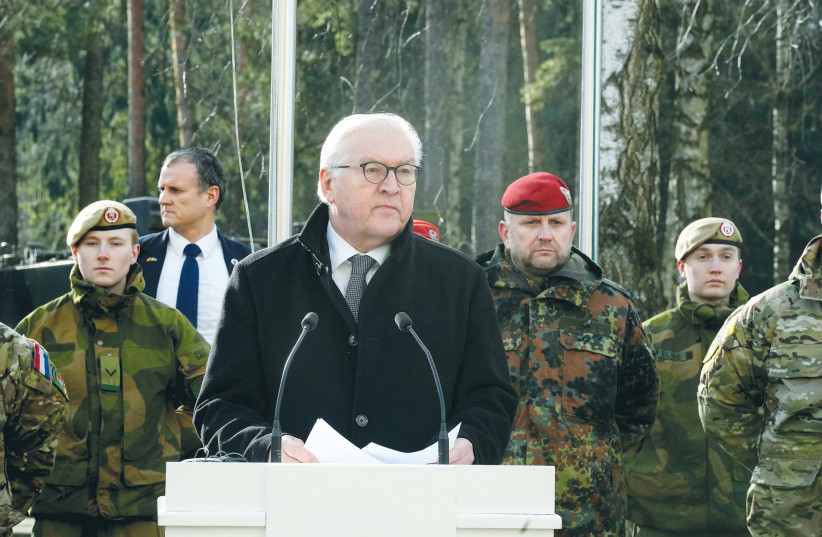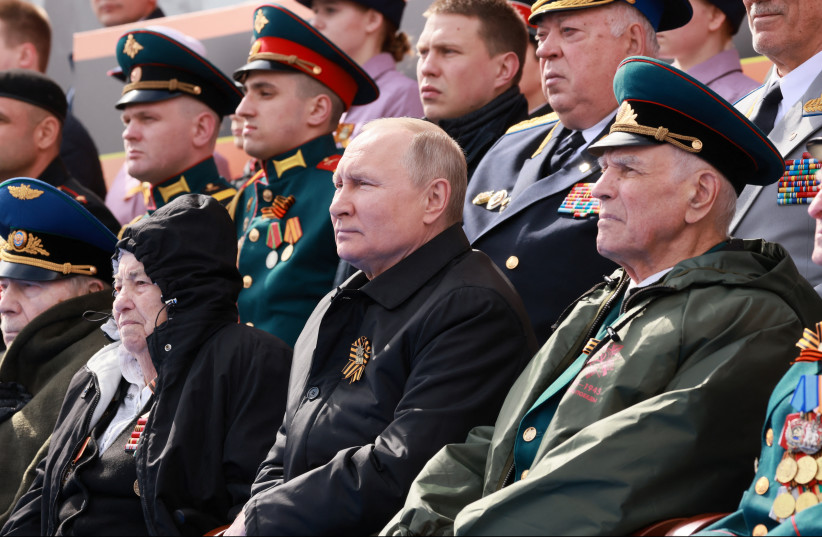Russia's invasion of Ukraine has plunged Europe into an era of insecurity, Germany said on Friday, a day after Russian President Vladimir Putin predicted a "dangerous" decade ahead.
German President Frank-Walter Steinmeier, who is from a wing of Germany's Social Democrats that long argued for closer economic ties to Moscow, said the Feb.24 invasion had ruptured those hopes.
"When we look at the Russia of today, there is no room for old dreams," Steinmeier said, referring to former Soviet president Mikhail Gorbachev's dream of a "common European home."
"It has also plunged us in Germany into another time, into an insecurity we thought we had overcome: a time marked by war, violence and flight, by concerns about the expansion of war into a wildfire in Europe," he said.
"Harder years, rough years are coming."

Germany, which has joined European sanctions against Russia and weapons deliveries to Ukraine, has recorded the arrival of more than a million Ukrainian refugees and warned of possible energy shortages this winter after cuts in Russian gas supplies.
Putin, addressing a conference in Moscow on Thursday, played down the prospect of a nuclear stand off with the West but accused Western leaders of inciting the war in Ukraine, which he says was justified by Kyiv's expressed wish to join NATO.
Western dominance over world affairs was coming to an end and "ahead is probably the most dangerous, unpredictable and, at the same time, important decade since the end of World War Two," Putin said.
The Russian leader insisted Moscow's war in Ukraine, which he calls a "special military operation" was going to plan as both sides prepare for a key battle in Kherson in Ukraine's south.
"When we look at the Russia of today, there is no room for old dreams."
German President Frank-Walter Steinmeier
One of four partially occupied provinces that Russia declared annexed last month, the region controls both the only land route to the Crimea peninsula - seized by Russia in 2014, and the mouth of the Dnipro river that bisects Ukraine.
Sergey Aksyonov, the Russian-appointed leader of Crimea, said work had been completed on moving residents seeking to flee Kherson to regions of Russia ahead of an expected Ukrainian counter-offensive.
Ukraine has accused Moscow of forcibly removing some people and recruiting others to fight against their will. Its general staff said what it called Russia's so-called evacuation was continuing, with hospital and business equipment removed and extra Russian forces deployed in empty homes.
Reuters was not able to verify the battlefield reports.
HIGH-LEVEL VISIT
Putin's first deputy chief of staff, Sergei Kiriyenko, visited Kherson and the Russian-occupied Zaporizhzhia nuclear power station, Aksyonov said on Telegram.
The United Nations is seeking to establish a safety zone around the plant, which lies near the frontline, due to fears of a disaster.
In recent weeks, Russia has unleashed a wave of missile and drone strikes, hitting Ukraine's energy infrastructure and forcing power cuts in Kyiv and other places, officials said.
Ukrainian President Volodymyr Zelenskiy said on Thursday the attacks "will not break us."
"To hear the enemy's anthem on our land is scarier than the enemy's rockets in our sky. We are not afraid of the dark," he said in a nighttime video address.
Ukraine has shot down more than 300 Iranian Shahed-136 'kamikaze' drones so far, air force spokesman Yuriy Ihnat told a briefing on Friday, referring to a weapon that has often been used in the past month to target crucial energy infrastructure.
It was not possible to verify the report. Iran has denied Ukrainian and Western assertions it is sending drones to Russia.
Ukrainian officials have said tough terrain and bad weather have made Ukraine's advances in Kherson and the east slower than its swift pushback of Russian forces in the northeast last month and Russia's hasty retreat from Kyiv early in the war.
NO CHANGE IN RUSSIAN AIMS
Putin made no mention of Russia's battlefield setbacks at the Moscow conference. When asked if there had been any disappointments in the past year, he answered simply: "No."
Putin said Russian aims had not changed.
Russia is fighting to protect the people of Donbas, Putin said, referring to an industrial region that comprises Donetsk and Luhansk - provinces in Ukraine's east he proclaimed annexed.

In Luhansk, Russian forces have tried to break through defenses in Bilohorivka but were beaten back, regional governor Serhiy Gaidai told Ukrainian television on Thursday.
Fighting has been going on in the Donbas since 2014 between the Ukrainian military and Russian-backed separatists.
Putin and other officials have repeatedly said Russia could use "all available means" to protect its territorial integrity, remarks interpreted in the West as implicit threats to use nuclear arms in fighting over parts of Ukraine that Russia says it has annexed.
Putin played down a nuclear standoff with the West, insisting Russia had not threatened to use nuclear weapons but had only responded to nuclear "blackmail" from Western leaders.
US President Joe Biden expressed skepticism, asking in an interview with NewsNation: "If he has no intention, why does he keep talking about it?"
